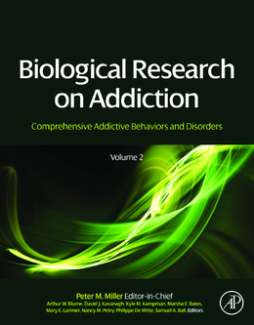
Additional Information
Book Details
Abstract
Biological Research on Addiction examines the neurobiological mechanisms of drug use and drug addiction, describing how the brain responds to addictive substances as well as how it is affected by drugs of abuse. The book's four main sections examine behavioral and molecular biology; neuroscience; genetics; and neuroimaging and neuropharmacology as they relate to the addictive process.
This volume is especially effective in presenting current knowledge on the key neurobiological and genetic elements in an individual’s susceptibility to drug dependence, as well as the processes by which some individuals proceed from casual drug use to drug dependence.
Biological Research on Addiction is one of three volumes comprising the 2,500-page series, Comprehensive Addictive Behaviors and Disorders. This series provides the most complete collection of current knowledge on addictive behaviors and disorders to date. In short, it is the definitive reference work on addictions.
- Each article provides glossary, full references, suggested readings, and a list of web resources
- Edited and authored by the leaders in the field around the globe – the broadest, most expert coverage available
- Discusses the genetic basis of addiction
- Covers basic science research from a variety of animal studies
"The book considers the neurobiological mechanisms of drug use and drug addiction as well as the animal models developed to gain this knowledge…This volume provides an in-depth, detailed review of the wide range of literature on the key neurobiological and genetic elements involved in the development of addictions. This is an exceptional comprehensive reference." Rating: 4 Stars--Doody.com, January 24, 2014 "Miller aims to improve the lives of addicts and their families through a comprehensive and detailed understanding of the addictive process, while providing a science-based approach to the study, prevention and treatment of addictions… It targets advanced undergraduates, graduates, and postdoc students, professors, researchers, clinicians, and policymakers."--Reference & Research Book News, December 2013
